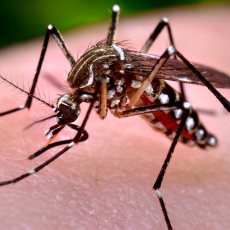

Zika is a virus that is spread by mosquitoes. A pregnant mother can pass it to her baby during pregnancy or around the time of birth. There have also been reports that the virus has spread through blood transfusions and sexual contact. There have been outbreaks of Zika virus in Africa, Southeast Asia, the Pacific Islands, parts of the Caribbean, and Central and South America.
Most people who get the virus do not get sick. One in five people do get symptoms, which can include a fever, rash, joint pain, and conjunctivitis (pinkeye). Symptoms are usually mild, and start 2 to 7 days after being bitten by an infected mosquito.
A blood test can tell whether you have the infection. There are no vaccines or medicines to treat it. Drinking lots of fluids, resting, and taking acetaminophen might help.
There have been reports of microcephaly (a serious birth defect of the brain) and other problems in babies whose mothers were infected while pregnant. The Centers for Disease Control and Prevention recommends that pregnant women do not travel to areas where there is a Zika virus outbreak. If you do decide to travel, first talk to your doctor. You should also be careful to prevent mosquito bites:
- Use insect repellent
- Wear clothes that cover your arms, legs, and feet
- Stay in places that have air conditioning or that use window and door screens
Centers for Disease Control and Prevention
- Question and Answers: Zika Virus Infection (Zika) and Pregnancy (Centers for Disease Control and Prevention)
- Zika Virus (Centers for Disease Control and Prevention)
- Zika virus disease Available in Spanish
- Zika Virus Fact Sheet (World Health Organization)Available in Spanish
 Zika Virus Infection
Zika Virus Infection  (Office of Rare Diseases)
(Office of Rare Diseases)- Zika Virus Infection (Pan American Health Organization)Available in Spanish




























.png)











No hay comentarios:
Publicar un comentario